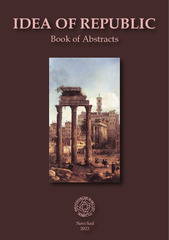Приказ основних података о документу
Which Public, Whose Affair: The Aporia of Republic(anism)
| dc.creator | Krstić, Predrag | |
| dc.creator | Ostojić, Aleksandar | |
| dc.date.accessioned | 2024-01-21T21:24:59Z | |
| dc.date.available | 2024-01-21T21:24:59Z | |
| dc.date.issued | 2023 | |
| dc.identifier.isbn | 978-86-6065-803-8 | |
| dc.identifier.uri | http://rifdt.instifdt.bg.ac.rs/123456789/3756 | |
| dc.description.abstract | The Republic always represented a certain emancipatory idea, a password, or a flag, which stood up against imperial tyranny (Rome) or hereditary monarchy (France). But that performance was neither unison nor monochrome. Perhaps the purest, ideal-type representation of the republic, with all the paradoxes and/or contradictions of its discourse, is offered by a republic that in the political sense could not be called by that name, or perhaps it was just a crypto-political republic, a so-called metaphor of the republic that, all the more, reveals its constitutive fragility. Respublica literaria is not a „real" republic, but it is not a complete chimera either: it had its members, but no citizenship that guarantees anything. It did not have its territorial boundaries, but it also knew how to limit the conditions of belonging to it – by proving a standard that we could maybe call intellectualistic, but a standard that was engaged inside communication. This is the contradiction we would like to expose in this paper. The fact that Respublica literaria consistently, to the point of paroxysm, followed the principle that it is not a private but a public matter and that this occurred alongside the fact that the public space, or the space of that public, was very limited, and more transparently indicated than usual. The characteristic not only of that republic but something like perhaps the fate of each: the first act of the French republic was the closing of the borders, similar to the Soviet one. The question is therefore whether the republic can exist in a 14 universal way or whether it implies exclusion. And vice versa, is the act of demarcation inevitable when establishing a republic that otherwise aspires to universality | sr |
| dc.language.iso | en | sr |
| dc.publisher | Univerzitet u Novom Sadu, Filozofski fakultet | sr |
| dc.relation | info:eu-repo/grantAgreement/MESTD/inst-2020/200025/RS// | sr |
| dc.rights | openAccess | sr |
| dc.rights.uri | https://creativecommons.org/licenses/by/4.0/ | |
| dc.source | Idea of Republic: Book of Abstracts | sr |
| dc.subject | Republic of Letters | sr |
| dc.subject | emancipation | sr |
| dc.subject | openness | sr |
| dc.subject | exclusion | sr |
| dc.title | Which Public, Whose Affair: The Aporia of Republic(anism) | sr |
| dc.type | conferenceObject | sr |
| dc.rights.license | BY | sr |
| dc.rights.holder | autori | sr |
| dc.citation.spage | 13 | |
| dc.citation.epage | 14 | |
| dc.type.version | publishedVersion | sr |
| dc.identifier.fulltext | http://rifdt.instifdt.bg.ac.rs/bitstream/id/13607/bitstream_13607.pdf | |
| dc.identifier.rcub | https://hdl.handle.net/21.15107/rcub_rifdt_3756 |

